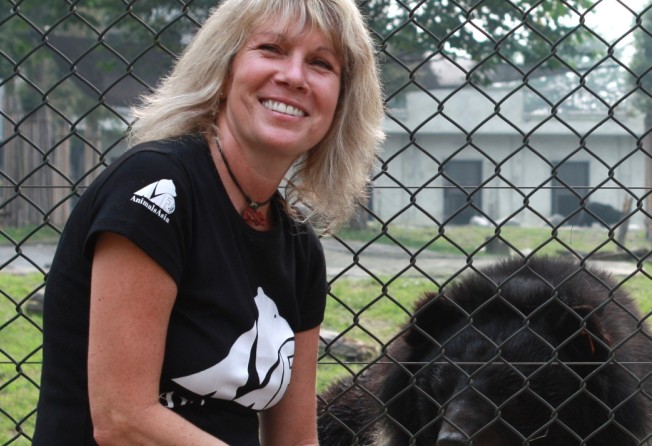
One woman’s battle to end the bear bile trade


At the sanctuary for Asiatic black bears or moon bears in Chengdu, Sichuan, province, a convoy of trucks arrives. The vets, mostly western, and the local staff members wait to offload the bears in the cages. It’s a long and delicate process that takes most of the day. The bears are nervous, many are in great pain, and this is a very new environment for them. They’ve come from a bear bile farm. Some may need medication to calm them down. All will later be anaesthetised for health checks.
On that day in Chengdu, the vets searched for the most acute cases first. As a journalist, I thought this would be a positive story of “Bubbles”, “George” or “Emily” finding a new home after years of torture. But the first bear had an abdomen so swollen that the pus and infected bile gushed out as they opened him up. And he was euthanized on the table in front of us. He wasn’t the only one.
For the bears that are rescued and survive a sanctuary awaits them in Chengdu, set up in 2000. Back then “Andrew” was the first bear of 60 to arrive. Another sanctuary has been set up more recently in Vietnam, where the bears can learn to forage again, play, and perhaps forget some of the years-long psychological and physical trauma of being prone in a cage barely bigger than their bodies.
Video: How Jill Robinson began her battle to end the bear bile trade
Robinson says that even as a child, growing up in Nottingham, England, she had a deep connection to animals. Her mother died when she was a baby in England, and she and her sister, Anne, were raised by their aunt and uncle for several years before returning to live with their father.
“Even though we didn’t have pets growing up, I always felt a deep connection for animals and Auntie always said she’d have to pull me away from running across a road if I saw a cat or dog on the other side,” says Robinson. “Even then I loved bears – and, finally coming to Hong Kong and discovering the horrors of bear bile farming just across the border definitely sealed my fate.”
Robinson, a former BBC administrator, had come to Hong Kong in 1985 and soon became a consultant with the International Fund for Animal Welfare. She constitutes another example in our Spirit of Hong Kong Awards campaign, of someone who saw a situation that they felt needed improving, and acted as an individual. Robinson managed to get on a trip to a bear bile farm in 1993 and was horrified by what she saw.
An individual act by Robinson - visiting bear bile farms, often in tandem with Sichuan and other local authorities, setting up the Animals Asia Foundation, talking with mainland government officials at both local and national level, and working constructively with the bear bile farmers to ensure that they also could find other forms of livelihood, has led to a massive seachange in views towards the bear bile industry in China.
“Who would have thought that 25 years later we would have rescued 400 bears in China and Vietnam,” says Robinson, “that we’d be seeing 19 out of 31 mainland Chinese provinces bear farm free and that last year bear farming would be one of the top 10 hottest topics discussed online in China. The tide has turned. The Chinese people do not want this cruel trade to be part of their proud tradition and it’s now a matter of time before this industry is brought to its knees.”
Robinson also set up “Dr Dog” in Hong Kong, back in 1991, where dogs are taken to hospitals and elderly centres and bring comfort and happiness to the patients and residents. The Dr Dog therapy scheme then spread later to Chengdu, Guangzhou and Shenzhen.
Robinson lives between her home in Sai Kung and her room on site at Animals Asia’s Chengdu bear sanctuary. She has three dogs and four cats in Hong Kong and two dogs in China.